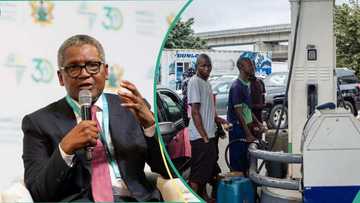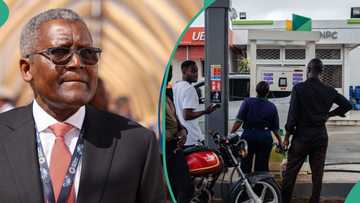Report Compares Cost of Producing Crude Oil in Saudi Arabia with Nigeria, Shares Result
- The cost of producing crude oil in Nigeria has risen to about $40 per barrel, according to NUPRC estimates
- This is 300% more expensive than the $10 per barrel cost of producing the same crude in Saudi Arabia
- The commission is worried that this discrepancy would make it more difficult for Nigeria to compete internationally
Legit.ng journalist Zainab Iwayemi has 5 years of experience covering the Economy, Technology, and Capital Market.
A report by the Nigerian Upstream Petroleum Regulatory Commission has estimated that the cost of producing crude oil in Nigeria has increased to almost $40 per barrel.

Source: Getty Images
Compared to the $10 per barrel cost of producing the same crude in Saudi Arabia, this is 300% more expensive, The Punch reported.
The NUPRC claims that Nigeria is finding it more and more difficult to compete on the international scene as a result of growing production costs and fluctuating oil prices.
The NUPRC said in a publication:
“At an average of $25 and $40 production costs per barrel, the nation’s upstream oil production costs are among the highest in the world.
“This range is significantly higher than production costs in top oil-producing countries like Saudi Arabia, where efficient operations allow for costs as low as $10 per barrel.”
Given that high production costs might restrict investor profitability, especially during periods of low global oil prices, the commission is concerned that this disparity would hinder Nigeria's capacity to draw in quality investment and compete globally.
According to a Punch report, a producer may have spent more than half of the price on production if petroleum sells for an average of $75 a barrel.
The regulator pointed out that the nation is aware of the difficulties.
“For a long time, it has identified many factors contributing to the high production costs. Many facilities, pipelines, and storage systems are outdated, leading to frequent maintenance needs and operational inefficiencies. Modernising infrastructure to cut down on repair costs, extend asset life and bolster productivity is therefore crucial.
“Oil theft and pipeline vandalism are another setback that impacts operational cost in the sector. Nigeria understands it must develop urgent solutions to curb these menaces and continue to show its determination to address them. The enactment of the Petroleum Industry Act in 2021 marked a pivotal point in this regard,” the commission said.
The NUPRC revealed that attempts are underway to bring the production cost down to $20.
“Since its emergence as the regulatory powerhouse in the upstream sector, the NUPRC has wasted no time in embracing the task of tackling existing challenges. In 2023, barely two years after its institution, it drew up a 10-year roadmap as a comprehensive strategy to revitalise and return the oil sector to its glory days.
“In 2024, in a shorter-term focus initiative under the broader decade-long Strategic Plan, the NUPRC effectively rolled out its Regulatory Action Plan with one of its key objectives being to lower the production cost per barrel of oil to at least $20,” the publication disclosed.
It argued that an oil business that does not prioritize production cost efficiency will surely find it difficult to attract new investment, hold onto larger profit margins, increase its ability to withstand market volatility and achieve overall economic growth.
Given that oil makes up about 90% of Nigeria's export earnings and a sizable amount of the government's income, it was said that the high cost of oil extraction presents threats to the stability and expansion of the economy.
According to the regulator, Nigeria has significant challenges in achieving the goal, but the immediate and long-term advantages of lowering production costs cannot be emphasized.
“Firstly, lowering production costs will make Nigeria’s oil sector a more appealing destination for foreign and domestic capital. This can inspire the country to compete more effectively with other oil-producing nations and retain a share of the global market. Similarly, by controlling oil production costs, oil companies can secure higher profit margins, even during periods of lower global oil prices.
“An increased profitability would ultimately benefit both operators and the sector, potentially leading to higher tax revenues and royalty payments. A combination of these factors can significantly boost Nigeria’s foreign exchange reserves and strengthen its resilience in the global oil market,” the report said.
Dangote refinery sells fuel to Saudi Arabian company
Legit.ng earlier reported that the mega Dangote Refinery sold two consignments of jet fuel to Saudi Aramco, the world’s biggest energy company valued at $1.92 trillion.
The move establishes Dangote Refinery as a global leader in the energy business.
President of Dangote Industries Limited, Aliko Dangote, disclosed this to the directors of the Nigerian Economic Group (NESG) during the facility’s tour on Tuesday, February 4, 2025, saying the refinery was making giant strides.
Proofread by Kola Muhammed, journalist and copyeditor at Legit.ng
PAY ATTENTION: Сheck out news that is picked exactly for YOU ➡️ find the “Recommended for you” block on the home page and enjoy!
Source: Legit.ng






